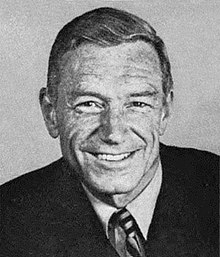Samuel S. Stratton
| Samuel S. Stratton | |
|---|---|
 |
|
| Member of the U.S. House of Representatives from New York's 32nd, 35th, 29th, 28th, 23rd district |
|
|
In office January 3, 1959 – January 3, 1989 |
|
| Preceded by |
Bernard W. Kearney R. Walter Riehlman Daniel E. Button Hamilton Fish IV Peter A. Peyser |
| Succeeded by |
Alexander Pirnie James M. Hanley Carleton J. King Matthew F. McHugh Michael R. McNulty |
| Mayor of Schenectady, New York | |
|
In office 1956–1959 |
|
| Preceded by | Archibald Wemple |
| Succeeded by | Kenneth S. Sheldon |
| Personal details | |
| Born | September 27, 1916 Yonkers, New York |
| Died | September 13, 1990 (aged 73) Gaithersburg, Maryland |
| Resting place | Arlington National Cemetery |
| Nationality | American |
| Political party | Democratic |
| Children | Brian U. Stratton |
| Alma mater |
University of Rochester Haverford College Harvard University |
| Military service | |
| Service/branch | United States Navy |
| Rank |
|
| Battles/wars |
World War II Korean War |
| Awards | Bronze Star (2) |
Samuel Studdiford Stratton (September 27, 1916 – September 13, 1990) was a Democratic political figure in Upstate New York. He is notable for his service as Mayor of Schenectady, and his 30-year career as a member of the United States House of Representatives.
Born in Yonkers, New York as the son of a Presbyterian clergyman, Stratton was a graduate of the University of Rochester, Haverford College, and Harvard University. He worked for two years on the staff of a Massachusetts Congressman, and then served in the United States Navy during World War II. After the war, he worked as an on air personality for television and radio stations in Schenectady, and served on the city council. He was recalled to active military duty for the Korean War, and served in Washington, DC.
After returning to Schenectady, he was reelected to the city council in 1953. In 1955 he was elected mayor. In 1958, Stratton ran successfully for Congress; he was reelected fourteen times, and served from 1959 to 1989. After unsuccessful attempts to run for higher office, and surviving efforts by the New York State Legislature to remove him through unfavorable redistricting, Stratton settled into a long career as a senior member of the Armed Services Committee. In addition to paying attention to local defense concerns, including manufacturing contracts for General Electric and the Watervliet Arsenal, Stratton took a lead role on other military-related issues, including admitting women to the service academies.
Stratton did not run for reelection in 1988, and retired to his home in Maryland. He died in Maryland in 1990, and was buried at Arlington National Cemetery.
...
Wikipedia
